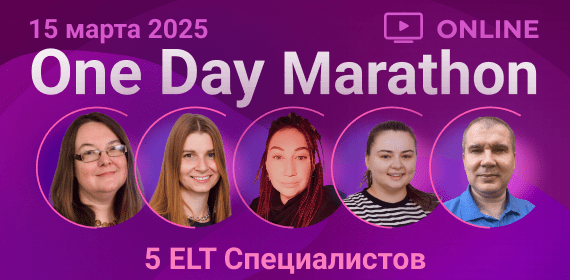One day Marathon for English Teachers: Experience. Excellence. Expertise
Date: 15 March 2025 (Saturday, Online)
Time: 9:50 - 16:30
Schedule:
9:50 - 10:00 - Opening
10:00 - 11:00 - Igor Churilov
11:15 - 12:15 - Nataliya Tutantseva-Maskileison
12:30 - 13:30 - Sofya Ivanenko
13:30 - 14:00 - Break
14:00 - 15:00 - Yulia Kovaleva
15:15 - 16:15 - Heather Belgorodtseva
16:15 - 16:30 - Closing
Format: Online
Speakers:
Igor Churilov

Helping Learners with Vocabulary Retention and Retrieval
Hardly does any lesson go without any vocabulary focus at all, be it explicit or implicit. But one of the most common complaints we hear from learners is about being unable to “remember new words”. Most textbooks are notorious for providing “fill in the gaps” activities and not much beyond that. They also don’t exploit texts to their maximum potential when it comes to lexical work.
In this session we will address / revisit different ways of dealing with lexis in class, put ourselves in our learners’ shoes to try out different tasks, and evaluate / adapt teaching materials all with the aim of boosting learners’ vocabulary retention and retrieval.
Nataliya Tutantseva-Maskileison

Guided Discovery - a way towards inductive efficient and engaging language acquisition.
Guided Discovery - inductive, efficient and engaging language acquisition.
Guided discovery is an important tool in the modern ESL classroom. It encourages learner independence through training inductive learning. It makes learning more memorable as students are fully involved in the process of learning about new language. And it can also be a meaningful communicative task in its own right.
In the session we are going to understand better what guided discovery methodology is and why it works, look at practical strategies for running guided discovery lessons for both lexis and grammar and analyze sample guided discovery worksheets, with a view to creating our own or improving published materials.

Projecting Success: Using Projects In YL Teaching
We are all familiar with the word 'project' - but what this actually involves, and how to use one successfully for language learning might be less clear - especially for an online YL classroom!
In this session you will find workable tips about how to incorporate projects into language classes so as to maximise the amount of meaningful language work students do. We're going to talk about setting up tasks efficiently, grading the level of challenge, and unleashing our students’ creativity - in online or offline classes. And we will go away with practical, concrete ideas for projects, including arts and crafts activities, for children from as young as 3 years old up to older teenagers.
Yulia Kovaleva

Teaching pronunciation. Is it still relevant in a globalised world?
No one can deny the impact of globalization on English language learning and teaching. We can easily see it as a major influence on educational tools, content and materials. However, how far should this phenomenon encroach on teaching approaches themselves? Some linguists have no doubts and claim that English standards have, or should have, changed dramatically within the last decade.
In this seminar, we will concentrate our attention on pronunciation and talk about English as Lingua Franca, and how this might change what we are trying to achieve. We will try to decide which phonological aspects are crucial to help students produce and which are important only for receptive understanding. Finally, we will analyze how these global changes might influence the language learning and teaching process in our context, finishing with some practical suggestions.
Heather Belgorodtseva

Using Telegram (or Whatsapp) for communicative language practice - for homework!
Getting students to spend enough time outside the classroom practising what they have learnt is often a challenge, as is getting them to use new language in a meaningful and communicative way.
This is where Telegram chats come in. Or, of course, Whatsapp, or any other similar tool.
In this session you will look at examples of tasks I have used to engage reluctant homework doers and recycle grammar and vocabulary from my lessons - communicatively. We will discuss why this medium is effective and formulate guidelines for coming up with and running such tasks. Finally, you will design your own such task.
E-certificate will be provided to all the participants.
Early bird registration fee : 6 500 rubles / 7 500 rubles (+ recordings) 5 places left!
Special offer: 7 500 rubles for schools: 3 participants + recordings







 Адрес
Адрес
 Телефоны
Телефоны
 Email
Email
 График работы
График работы

